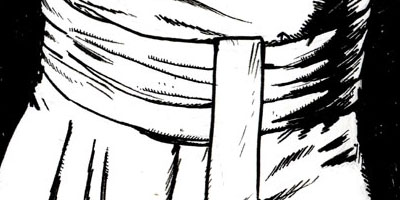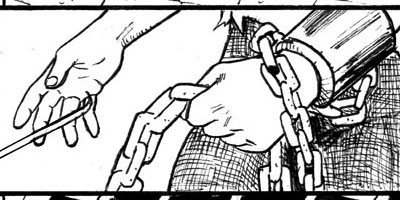
18
Apr
17
Apr
Competitive Geekery
Posted by John Seavey Published in General Nerd Crap, General Nerd Shit, The InternetsLast month, io9 did a “March Madness” competition in which they did head-to-head polls of the popularity of 64 different movies, then pitted the winners against each other repeatedly until “The Empire Strikes Back” went up against “Serenity” for the title of…and even before I’m describing it, the analogy breaks down. “Best Sci-Fi Movie”? I don’t think anyone involved really thinks that these two films represent the pinnacle of the genre. (Actually, I don’t think there is such a thing as the “science fiction genre”, but that’s a rant for another time.) “Most Popular”? Among a subset of a subset of a subset of science-fiction fans, perhaps. So why do some people feel the need to vote in these popularity contests? Why do we feel the need to rank these movies? What is, in short, going on here?
I think that at heart, it comes from something we, as geeks, try very hard to pretend isn’t true: We need validation. We like to think that we’ve gotten used to finding enjoyment in the obscure and the esoteric, that we don’t care whether anyone else likes it as long as we do…and to some extent, that’s not entirely untrue. I have long ago accepted that my unquestioning adoration of “Jason X” and “Mortal Kombat” and “Kung Pow: Enter the Fist” is never going to be reciprocated by even other sci-fi fans, and I’m okay with that. (You don’t know what you’re missing.)
But nonetheless, there is that need. The need to show that we are right in loving our favorite films, that it’s not just us but everyone who understands the appeal of Joss Whedon’s film masterwork. Even more than that, there’s the need to prove that we’re in the majority. (There’s a certain perverse brilliance to the way geeks handle popularity. Instead of desperately trying to join the “in” crowd, we desperately try to prove that the “in” crowd is the crowd we’re already “in”. With statistical data to back it up, too!)
It’s not the worst thing in the world, of course. (Taking it all seriously, on the other hand, is. The comment boards on io9 were filled with utter, incoherent nerdrage at the fact that Whedonites cheated, or that “Blade Runner” is clearly the best film ever made and it’s a shame that modern sci-fi fans don’t appreciate its greatness, or that none of the sixty-four films are anything like as good as “Kung Pow: Enter the Fist”. Um, not that I’m admitting anything.) But it nonetheless amazes me how hard it is to escape that need for validation, how hard it is to just enjoy the things we enjoy and leave it at that.
Then I look at the ESPN Power Rankings and remind myself that competitive geekery isn’t limited to science-fiction.
14
Apr
From yesterday:
Last time someone asked you if you were homosexual. While I don’t have issues with any sexual orientation, I am curious.
I’m straight; almost embarrassingly straight, in fact. The sexual continuum theory is one I have no beef with, but I know perfectly well that I’m on the very edge: men do absolutely nothing for me. Sometimes I feel like I’m missing out, but then I remember I’m lucky enough to be straight and white and male and not even a member of some relatively marginalized religious or ethnic group and I feel better about it.
Heck, I can speak in an assertive, commanding tone and people automatically assume I know what they should do! In any given situation! Do you have any idea how great that is? Because it’s pretty great, I tell you what.
14
Apr
NOTE: This was the first of these, written back for my Livejournal back when I was still on Livejournal. However, it does not appear to have been web-archived, and besides, I might as well rewrite it now. So this is a revamped version of the original article.
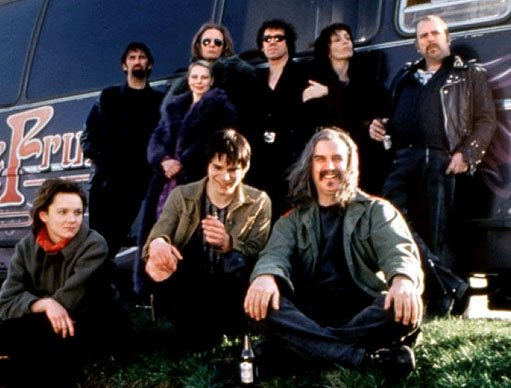
Still Crazy came out in 1999, did mediocre box office at best (I checked Boxofficemojo and it made less than half a million dollars in the USA, and not much more in the UK), got good reviews and a couple of Golden Globe nominations (for best comedy/musical and best original song) and then faded into relative obscurity. This is a pity, because Still Crazy‘s main sin as a movie is that it apparently came out at the wrong time.
After all, it has Bill Nighy in an extremely Bill Nighy sort of role, but five years before Bill Nighy really broke through as Bill Nighy in Love Actually (and whatever you may think of that film, it let Bill Nighy be Bill Nighy), and in Still Crazy Bill Nighy basically plays the same character as in Love Actually except this time he’s not a cariacature. It’s about 70s glam rock, but came out one year after Velvet Goldmine, a wildly overpraised and overly serious take on the same subject. (Still Crazy also has original songs – and good ones – rather than a pastiche soundtrack that sounds like somebody’s mixtape.) It’s a comedy about getting old, maybe six or seven years before Boomers really started realizing that they were getting old and made Nancy Meyers rich as a result.
And it’s really a great little movie, chock-full of great performances from Nighy, Stephen Rea, Timothy Spall, Juliet Aubrey and Billy Connolly. See, Strange Fruit were really big in the 70s, but twenty years later, like so many other bands, they’re a musical footnote, just another band which feuded endlessly and collapsed under its own weight. But when a nostalgic music exec who’s putting together a memorial show of a famous 70s concert – the concert where the Fruit broke up permanently – spots Stephen Rea’s former keyboardist Tony working in a resort, he suggests an appearance by the Fruit at the memorial concert, and of course that means Getting The Band Back Together.
Except, of course, it’s never that simple in real life, and one of the nice things about Still Crazy is that although it’s got plenty of the requisite old guys’ reunion/on-the-road wacky comedy, it never lets things be simple or cut and dry. Brian, the former lead guitarist, is missing and presumed dead, so the band has to recruit a new young guy to replace him because Ray, the lead singer, can’t really both sing and play lead guitar at the same time. Tony’s been carrying a torch for Karen, the former roadie and now manager, for practically ever, but she’s still in love with the memories of Brian and can’t shake them. Les, the bassist, still resents Ray because Ray came over after the band’s original singer Keith died of an overdose, and because Les never got to sing any songs back in the day. Les and Beano, the drummer, are still both nostalgic for Keith and can’t shake the idea that the band died with him. Ray’s quietly terrified that, despite being the richest of the Fruit thanks to a reasonably lucrative singles career, he’s only ever going to be a musical footnote. Oh, and Beano is being pursued by the revenue service for unpaid taxes, because it is still a wacky comedy.
And throughout the movie, death is an omnipresent force. These guys are old now, in their minds if nothing else – they’re on the road trying to rock out in their late forties and early fifties. They can’t help but feel slightly ridiculous, and worse they’ve got dead bandmates hanging over their shoulders. They’re grabbing desperately at their one last chance for real musical relevance and to be remembered, and they know it’s desperate and they’re doing it anyway, because it really is their last chance, not just to be musical stars but to grow old on their own damn terms, which is something many people never get to do at all. And because this is something we all want for ourselves in our own way, that’s why it’s good –
– along with the songs, which are excellent.
– and the performances, which are great.
– and the gags, which are really funny without being forced.
13
Apr
I’m still burned out from last night’s debate coverage so it’s time for another one of these: what would people like me to write about? (As usual, no requests for “I should write X.”)
Additionally, if anybody has any old Battletech miniatures lying around that they don’t want, email me and we’ll discuss ’em: I’m getting back into the game.
12
Apr
I’m liveblogging the Canadian federal election debate over at Torontoist.
12
Apr
Waiting For Improved Archie
Posted by MGK Published in Archie (Improved Or Otherwise), Comics, Interactive Fun Time Party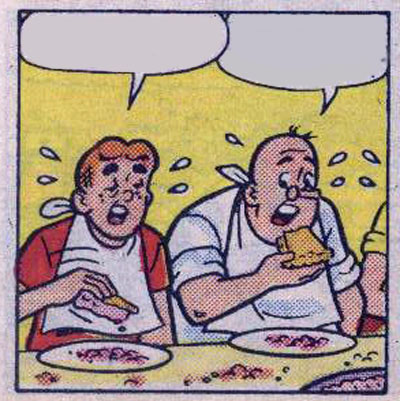
11
Apr
My weekly TV column is up at Torontoist.
11
Apr
9
Apr
Other Directions ‘Star Wars’ May Have Taken
Posted by John Seavey Published in Flicks, General Nerd Crap, Writering, WTFOkay, follow along with me here. It’s well-known that George Lucas was a big Kurosawa fan during his formative years as a film-maker, and that he cites ‘The Hidden Fortress’ by Kurosawa as a key inspiration for ‘Star Wars’. Some have even described Lucas’ movie as a science-fiction remake of ‘The Hidden Fortress’, much the same way as ‘A Fistful of Dollars’ is a Western remake of ‘Yojimbo’. Which leads me to wonder, what might have happened if Lucas had been inspired by a different Kurosawa film? What if it wasn’t ‘The Hidden Fortress’ that shaped the direction of his classic film?
The Seven Samurai: Tatooine moisture farmer Luke Skywalker stumbles upon information that his insignificant homeworld is about to become the crux in the Empire’s plan to destroy the Rebellion. Princess Leia of Alderaan, a key figure in the Rebellion, is coming to this distant world to exchange vital information with Rebel spies; little does she know that the Empire has already learned of her mission, and has set a trap for her with a hidden garrison of Imperial troops…a garrison led by the Emperor’s personal enforcer, Darth Vader. Skywalker longs to help the princess, but he’s only one man, and an untrained fighter at that; he needs help if he’s going to save her. So he recruits a rag-tag band to help him: An exiled Jedi Knight named Ben Kenobi, a smuggler with a heart of gold named Han Solo, a bestial Wookie named Chewbacca, a grizzled bounty hunter named Boba Fett, and a Rebel pilot named Wedge Antilles. The six of them rescue the princess from the initial ambush; and together, the seven of them retreat into the Tatooine desert, where they use Ben’s knowledge of the terrain to slowly winnow away the Empire’s advantage of numbers. In the end, although Ben and Boba die in battle, Leia succeeds in her mission and (possibly) begins the end of the Empire.
Yojimbo: In the distant galactic backwater of Mos Eisley, Ben Kenobi (a former Jedi Knight who fled to the Galactic Rim after the fall of his order) becomes embroiled in the middle of a war between rival gang lords Jabba the Hutt and Xizor. He hires himself out first to one, then the other, playing both sides against the middle while he secretly works to clean up “the most wretched hive of scum and villainy.” The end features him dueling against Jabba’s top enforcer, Boba Fett. (The scary thing is, this requires only minimal changes to fit into continuity…)
Rashomon: In the aftermath of the death of Jedi Knight Obi-Wan Kenobi at the hands of Sith Lord Darth Vader, we see differing interpretations of the event from Vader, Kenobi, Leia, and finally the droid duo of C-3P0 and R2-D2. In the end, though we see many versions of the final battle between the two, the truth remains elusive and unknowable.
The Lower Depths: Owen Lars and his wife, Beru, run a small flophouse on Tatooine for scoundrels down on their luck. Among them is Han Solo, a smuggler and thief, and Ben Kenobi, a mysterious wise old man with a troubled past. Han is having an affair with Beru, but his growing friendship with Beru’s nephew Luke makes him consider breaking it off. At the same time, his admiration for Ben makes him think about finding a better life. When he discovers that Owen and Beru beat Luke, he breaks into their house to defend his young friend, only to wind up inadvertently killing Owen. Beru claims that he did it to continue their affair, which ends his friendship with Luke, and Ben flees when Imperial stormtroopers come to arrest the smuggler. In the end, Beru is arrested as well, leaving Luke without guidance and support.
Ran: Emperor Palpatine’s ambitious plan for his succession backfires on him when he delegates power to three of his most senior advisors, Grand Moff Tarkin, Grand Admiral Thrawn, and his apprentice and “son” created through Jedi magic, Darth Vader. Vader questions the wisdom of splitting the Empire between so many ambitious men, and is disowned and banished along with his droids. But Vader is proven right when Tarkin and Thrawn go to war over the Empire, and both of them try to put the Emperor out of the way as a potential obstacle; with his Royal Guard slaughtered, the insane Palpatine is left to wander the countryside. There he is discovered by R2D2 and C3Po, two of Vader’s droids that have remained loyal to the Emperor. They take refuge in a peasant’s hut on the swamp world of Dagobah, only to find it occupied by Yoda, Palpatine’s old Jedi foe who he had ordered to be blinded.
Vader discovers what happened to Palpatine and gathers an army to find him; this is viewed as an attempt at conquest by Tarkin and Thrawn, who send their own armies to stop him. In the final battle, the three armies weaken each other to the point where the Rebel Alliance is able to overthrow them; it’s revealed, in the end, that this was the ultimate goal of Tarkin’s wife, Mon Mothma. Tarkin kills Mothma, but is himself killed when Rebel ships blow up his Star Destroyer. Vader finds Palpatine, but is killed by Boba Fett, an assassin sent after him by Tarkin before his death. Overcome with grief, Palpatine dies, marking the end of the Empire. The film ends with a shot of Yoda, blind and alone on Dagobah, the only survivor of the film’s events.
(And by the way, before anyone thinks to comment on it, yes, I know ‘Ran’ came out after the trilogy was finished. If I can postulate an alternate universe where Lucas based ‘Star Wars’ on other movies, I can postulate one where he did it a decade later.)
9
Apr
Danny Sichel messaged me to say:
The backstory to Nunsense is that a large group of nuns die of food poisoning. Food poisoning is not a comfortable death. Are we supposed to imagine, when attending this hit off-Broadway comedy, the previous group of nuns screaming in agony as they shit out their intestines?
Of course, Futurama used the same basic setup as regards the Planet Express crew prior to Fry, Leela and Bender. But they are cartoons, so the horrible deaths are more permissible, I suppose.
8
Apr
Most of Marvel’s recent1 crossover events, if nothing else, have all had a good, simple byline for curious readers. House of M: “the Scarlet Witch changes reality and then there is a big fight.” Civil War: “Marvel’s heroes pick sides and have a big fight.” Secret Invasion: “Skrulls invade and there is a big fight.” Siege: “Norman Osborn invades Asgard and there is a big fight.” And so on and so forth. There may be twists and turns, but generally after one issue you know the basic reason as to why there is going to be a big fight, and that is the important thing.
Fear Itself boldly goes a different direction: its first issue reads like a #0 issue. There is a bit of Odin beating the hell out of Thor, but barely that. There is a bit of Sin fighting some Nazis, but villains beating up nameless flunky losers is never really that interesting to begin with. There is a riot so vague that you have to wonder if its vagueness is a plot point (seriously, at one point Captain America – er, Steve Rogers – is asked about “the issue” in a way that makes it seem quite possible that they intended to insert one but just forgot and then at some point a typesetter removed the brackets from “[ISSUE]”). It seems to be referring to the Ground Zero mosque debate from last year, sort of, but a Marvel Universe equivalent thereof where nobody ever says anything specific.2
And then the gods of Asgard go… back to Asgard. Presumably this is meant to be dramatic somehow, but I’m not sure why the gods of Asgard going back to Asgard is a big deal at this point. I don’t read Thor – to be perfectly honest it’s the one Marvel property I have never been able to really get into, regardless of who was writing or drawing it – but I know that the gods of Asgard are traditionally in Asgard, and that making this be a Big Deal seems wrong, much as it would be silly to make it be a Big Deal when Spider-Man starts wearing his regular costume again or when Steve Rogers becomes Captain America again. That doesn’t mean writers won’t try, but status-quo-restoring events are almost always less enthralling than disruptive ones: Captain America Reborn wasn’t as good as The Death of Captain America, Knightsend wasn’t as good as Knightfall, and so on.3
Equally silly is having Odin ruminate about a “final prophecy.” Never mind that it’s obviously bull in an ongoing comics universe to have a “final prophecy” be a plot element to begin with – after all, what’s the next writer going to do, except say “well, there’s actually a final-er prophecy.” But I know enough about Thor in the Marvel Universe to know that the reason the gods are on Earth right now (and, presumably, the reason Thor has a new costume) is because Ragnarok already happened in the Marvel Universe. It was the whole reason JMS had to write how Loki was a chick for a while. Come to think, it’s the reason the gods of Asgard are on Earth in the first place. How does a Norse pantheon get more final than frigging Ragnarok? Is this Ragnarok II: Pseudo-Norse Boogaloo?
Other than that, the issue’s big reveal is that there’s another Norse deity with another hammer and another Odin, or at least someone who suggests that the Odin that’s beating up Thor is a replacement Odin, like a Norse equivalent of Dick Whitman pretending to be Don Draper. All of this feels kind of repetitive, because it’s kind of repetitive: at present it feels like the same old “hey, what if there was another version of [HERO]” that’s basically been the same story over and over again in Green Lantern for the past four or five years.4
(Granted, “another version of something” has been a comic storytelling tool since writers first decided there could be more than one type of Kryptonite. But ultimately, the problem with it is that it’s only as useful as the property you’re re-versioning is popular. I was mildly interested in Green Lantern, so different coloured and themed Lanterns was mildly interesting to me; I don’t really give much of a damn about Thor, so I am not Fear Itself’s target market, and my dissatisfaction with the book therefore comes with a huge caveat.)
That having been said, I have a lot of faith in Matt Fraction’s storytelling abilities; the man has written a bunch of my favorite superhero comics of the past five years, including two (Immortal Iron Fist and Invincible Iron Man) that would make my top five. So I’m willing to give him time to rebound from what’s ultimately a lackluster beginning. But a lackluster beginning it unfortunately is.
- Okay, I know that going back to 2005 stretches the definition of “recent,” but you know where I’m going with this. [↩]
- Maybe they’ll get Doctor Doom to cry again. [↩]
- Final Crisis: Legion of Three Worlds is the rare exception of a status-quo-restoring event that’s generally better than what disrupted the status quo, but this is mostly because those disruptive comics were so incredibly shitty that a basically okay comic book was able to seem like spun gold in comparison. [↩]
- It doesn’t help that Skadi doesn’t actually appear to be associated with a hammer in traditional Norse mythology, making her feel somewhat shoehorned into the role of Anti-Thor. [↩]
7
Apr
So Taco Bell is apparently giving away free tacos for the next seven days. This is fine and good, but of course some people are complaining about it because Taco Bell meat is, basically, about half made of oatmeal.
To which my response is a hearty “so what?” Hey, do you remember those Taco Bell commercials from a couple years ago, where they were promising to fill you up with a massive amount of food for $1.99? Yeah, you remember those, and in fairness Taco Bell did indeed deliver a relatively massive amount of food for said amount of money. Did you really think that it was going to be all-natural premium ingredients? Here’s a quick fun experiment you can do: go to the supermarket and look to see how much a pound of beef costs. Do you think that pound of beef was really going to turn into a profit source for Taco Bell selling tacos from it at dirt-cheap prices? No. No it wasn’t. So what people are complaining about here is that Taco Bell was not able to make meat appear by magic and then sell it.
Of course, what’s even sillier are people proclaiming they will never eat Taco Bell again because the meat has been “adulterated.” These people are acting like oats in the meat somehow poisons it. It is frigging oatmeal. It is basically the healthiest thing in the world. At worst, what Taco Bell has been doing is making vaguely Mexican-flavoured meatloaf, grinding it up, and putting it in their tacos. At best, they’ve been actively improving the flavour and health value of what is, let’s be honest, industrial-grade beef, and making it cheaper for you to eat it at the same time.
This is not me endorsing Taco Bell as a restaurant, because I don’t like Taco Bell much at all. (I do like their fries.) But if you like Taco Bell, I don’t see why you wouldn’t go get yourself a free taco this week, because you apparently liked that until somebody told you you weren’t being a super-awesome carnivore as much as you thought you were.
7
Apr
(oh god this probably makes me old and creepy doesn’t it)
(but she’s so good)
6
Apr
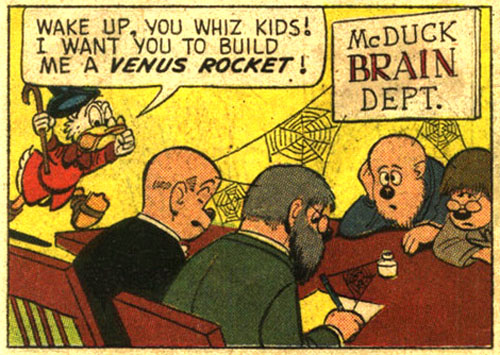
Also, you should see Scrooge’s healthcare plan. It is the bomb, yo.
Search
"[O]ne of the funniest bloggers on the planet... I only wish he updated more."
-- Popcrunch.com
"By MightyGodKing, we mean sexiest blog in western civilization."
-- Jenn
Contact
MGKontributors
The Big Board
MGKlassics

Blogroll
- ‘Aqoul
- 4th Letter
- Andrew Wheeler
- Balloon Juice
- Basic Instructions
- Blog@Newsarama
- Cat and Girl
- Chris Butcher
- Colby File
- Comics Should Be Good!
- Creekside
- Dave’s Long Box
- Dead Things On Sticks
- Digby
- Enjoy Every Sandwich
- Ezra Klein
- Fafblog
- Galloping Beaver
- Garth Turner
- House To Astonish
- Howling Curmudgeons
- James Berardinelli
- John Seavey
- Journalista
- Kash Mansori
- Ken Levine
- Kevin Church
- Kevin Drum
- Kung Fu Monkey
- Lawyers, Guns and Money
- Leonard Pierce
- Letterboxd – Christopher Bird - Letterboxd – Christopher Bird
- Little Dee
- Mark Kleiman
- Marmaduke Explained
- My Blahg
- Nobody Scores!
- Norman Wilner
- Nunc Scio
- Obsidian Wings
- Occasional Superheroine
- Pajiba!
- Paul Wells
- Penny Arcade
- Perry Bible Fellowship
- Plastikgyrl
- POGGE
- Progressive Ruin
- sayitwithpie
- scans_daily
- Scary-Go-Round
- Scott Tribe
- Tangible.ca
- The Big Picture
- The Bloggess
- The Comics Reporter
- The Cunning Realist
- The ISB
- The Non-Adventures of Wonderella
- The Savage Critics
- The Superest
- The X-Axis
- Torontoist.com
- Very Good Taste
- We The Robots
- XKCD
- Yirmumah!
Donate
Archives
- August 2023
- May 2022
- January 2022
- May 2021
- January 2021
- December 2020
- October 2020
- June 2020
- March 2020
- January 2020
- December 2019
- October 2019
- February 2019
- January 2019
- December 2018
- April 2018
- March 2018
- February 2018
- January 2018
- December 2017
- November 2017
- October 2017
- February 2017
- January 2017
- December 2016
- November 2016
- October 2016
- September 2016
- August 2016
- July 2016
- June 2016
- May 2016
- April 2016
- March 2016
- February 2016
- January 2016
- December 2015
- November 2015
- October 2015
- September 2015
- August 2015
- July 2015
- June 2015
- May 2015
- April 2015
- March 2015
- February 2015
- January 2015
- December 2014
- November 2014
- October 2014
- September 2014
- August 2014
- July 2014
- June 2014
- May 2014
- April 2014
- March 2014
- February 2014
- January 2014
- December 2013
- November 2013
- October 2013
- September 2013
- August 2013
- July 2013
- June 2013
- May 2013
- April 2013
- March 2013
- February 2013
- January 2013
- December 2012
- November 2012
- October 2012
- September 2012
- August 2012
- July 2012
- June 2012
- May 2012
- April 2012
- March 2012
- February 2012
- January 2012
- December 2011
- November 2011
- October 2011
- September 2011
- August 2011
- July 2011
- June 2011
- May 2011
- April 2011
- March 2011
- February 2011
- January 2011
- December 2010
- November 2010
- October 2010
- September 2010
- August 2010
- July 2010
- June 2010
- May 2010
- April 2010
- March 2010
- February 2010
- January 2010
- December 2009
- November 2009
- October 2009
- September 2009
- August 2009
- July 2009
- June 2009
- May 2009
- April 2009
- March 2009
- February 2009
- January 2009
- December 2008
- November 2008
- October 2008
- September 2008
- August 2008
- July 2008
- June 2008
- May 2008
- April 2008
- March 2008
- February 2008
- January 2008
- December 2007
- November 2007
- October 2007
- September 2007
- August 2007
- July 2007
- February 2007
Tweet Machine
- No Tweets Available
Recent Posts
- Server maintenance for https
- CALL FOR VOTES: the 2021 rec.sport.pro-wrestling Awards
- CALL FOR NOMINATIONS: The 2021 rec.sport.pro-wrestling Awards (the Theszies)
- The 2020 RSPW Awards – RESULTS
- CALL FOR VOTES: the 2020 Theszies (rec.sport.pro-wrestling Awards)
- CALL FOR NOMINATIONS: The 2020 Theszies (rec.sport.pro-wrestling awards)
- given today’s news
- If you can Schumacher it there you can Schumacher it anywhere
- The 2019 RSPW Awards – RESULTS
- CALL FOR VOTES – The 2019 RSPW Awards (The Theszies)
Recent Comments
- George Leonard in When Pogo Met Simple J. Malarkey
- Blob in How Jason Todd Went Wrong A Second Time
- Cindi Chesser in Thursday WHO'S WHO: The War Wheel
- Scott Hater in Bing, Bang, Bing, Fuck Off
- dan loz in Hey, remember how we talked a while a back about b…
- Sean in Server maintenance for https
- Ethan in CALL FOR VOTES: the 2021 rec.sport.pro-wrestling A…
- wyrmsine in ALIGNMENT CHART! Search Engines
- Jeff in CALL FOR VOTES: the 2021 rec.sport.pro-wrestling A…
- Greg in CALL FOR VOTES: the 2021 rec.sport.pro-wrestling A…
